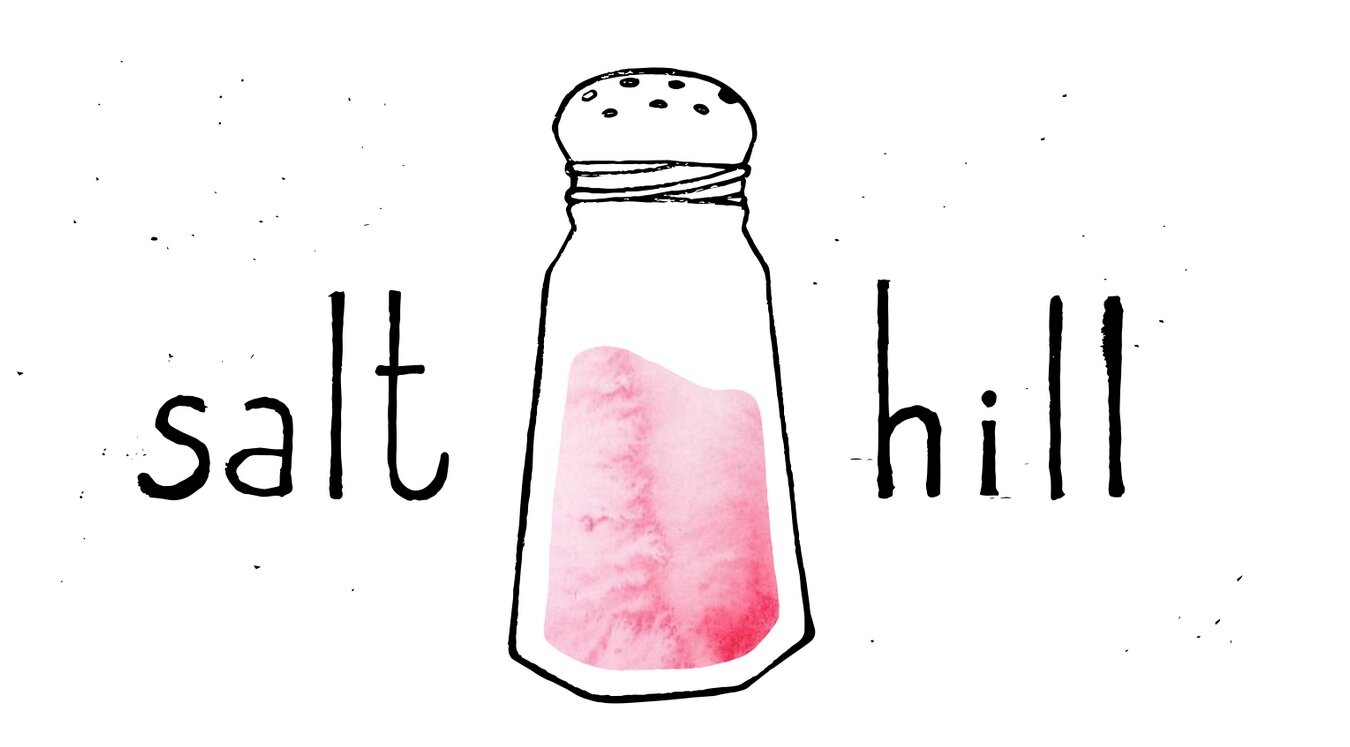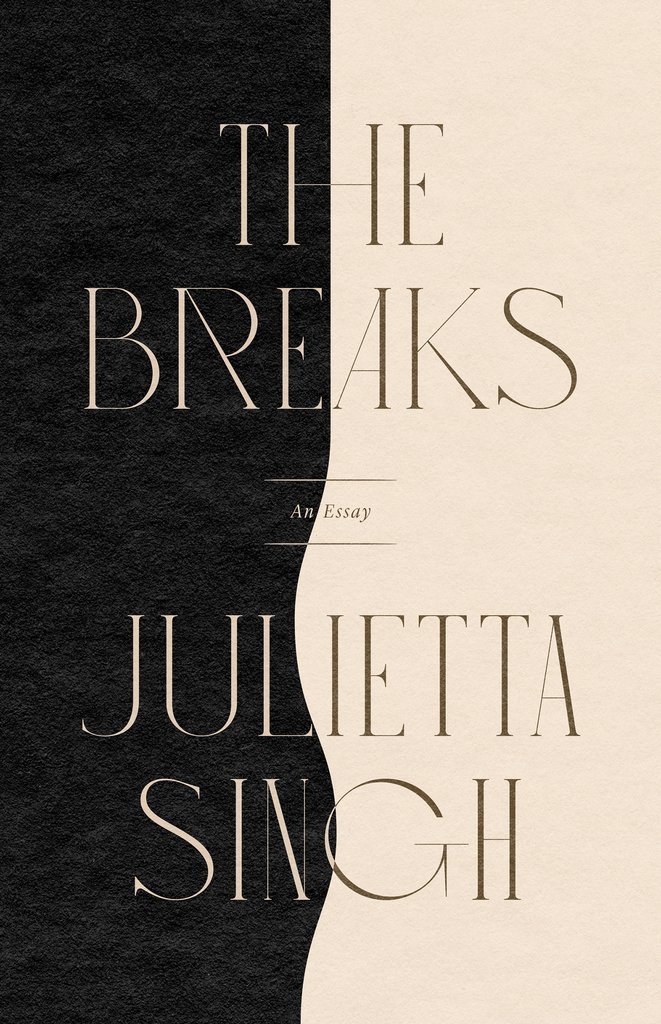Parenting amid catastrophe: A review of Julietta Singh's THE BREAKS
the breaks by julietta singh — coffee house press, 2021
essay / 168 pages / $16.95
reviewed by Alyssa Witbeck Alexander
Julietta Singh’s longform essay, The Breaks, written as a letter to her six-year-old daughter, meditates on some of the largest issues of living in the contemporary United States: colonialism, race, parenting, climate change, identity. She structures the essay around the physical, social, and emotional breaks—her bones crack, relationships fracture, she collapses the status quo. Singh uses these breaks as entry-points to write to her daughter about social justice and ecological crises.
The letter is written to her daughter at six-years-old and to her daughter in the future—the daughter who will as a girl and future woman of color inevitably be expected (in ways others are not) to carry the burden of breakage in a modern world.
Singh weaves the connection between her and her daughter, not just through blood and the once joined bodies, but the experiences and realities of Brown women. Singh writes, “We are beginning to lean into the breaks because we must, because in this requisite shift we can sense profound potential to become a more promising form of our collective selves”.
Singh’s desperation is clear. She teaches her daughter how to exist in a world broken by climate change, racism, and poverty. She aches for her daughter to live and thrive while reckoning with systemic issues rather than hiding from them.
While Singh wrestles with the physical and emotional pain in the fractures, she holds to concepts of strength and empowerment, her letter ultimately the symbol of a mother building her daughter amid the rubble. Singh’s uncertainty about how to write to her daughter, how to “mother at the end of the world” with the “infinite toggle between wanting to make you feel safe and needing you to know that the earth and its inhabitants are facing a catastrophic crisis” holds the center of this essay. Parenting amid catastrophe, Singh implores her daughter to participate in social justice. Her writing flows between exploring the pains and danger of breakage and offering a maternal tenderness, a space to cradle her child among the wreckage and offer a soft hope.
Singh grapples with knowing that one day her daughter must “break from me to save yourself, abandoning me to save us both”. How, in a world of consistent change, their worldviews will, one day, snap. The perspective that Singh teaches her daughter today will eventually become outdated, fracturing to make space for new truths that emerge in an evolutionary world.
In that breakage, her daughter will, while gathering wisdom from a history of foremothers, build a new future. A future that Singh herself cannot yet imagine and knows now she will not be ready for; a future that the next generation must form.
While much of the breakage Singh writes about depicts ruin, she frames the inevitable separation between her and her daughter as breaking into growth. I read this as a commentary on the complication of parenting, similar to feeling both pain and pride for a child growing up, leaving home, and building an individual life.
Early in the essay, Singh reveals her most intimate desire that “you find a way to break with me rather than to break from me.” She repeats the mantra to her daughter, “break with me, break with me, break with me”. Singh’s letter prepares her daughter for the ways society will fail her. She pleads that though her daughter will one day find additional failings that Singh has not yet recognized, they can support each other through them. Instead of clean separation as her daughter forges her own path, mother and daughter cut into these new ideas, this new world, these bigger breaks, together.
And yet, despite Singh’s hope, she repeats throughout the essay that at some point, mother and daughter must fissure. “For the sake of life itself,” she writes, “I need you to lose me”. So much of the letter is a plea to connect with her daughter, while also reckoning with the inevitable crack between them, the break that her daughter will need to further progress.
Singh describes losing her relationship with her own mother, also an urgent activist. She considers her relationship, how “each of our relational breaks over time could by definition constitute a mutual choice, not a single one has felt this way.” She describes this loss as leaving “us with an emotional gash, and each tentative return is a precarious stitch back into each other’s bodies”. While her and her mother reassemble their bond, Singh contemplates how her mother’s ideas are inscribed into her own daughter. Still, she knows that the relationship can never be unbroken, that relationship fractures are, to some degree, universal.
The Breaks interrogates a collection of crises and systems collapsing—a heavy and consuming list of traumas in 168 pages. Yet so much of the power of this essay exists in Singh’s refusal to narrow down consumption. I read this essay slowly, overwhelmed by the sheer volume of content packed with such concision, and I took my time to meet the breakage at the page. I marked each introduction of a new break with my pen, often sitting alone after reading a section to process the breadth of traumas.
But Singh does not have the privilege to pick and choose which issues to equip her daughter for. The essay is all-consuming because the overwhelming world her daughter enters demands attention. Even at the end of the essay, Singh reveals that “just as soon as this book is finished” coronavirus pushes the publication of her book into the future. Singh “can’t help but wonder what these words will mean in that future time, whether all these pages that anticipate the end of one world will speak to the one that comes after”.
The world that meets The Breaks needs her essay as much as—if not more than—the one she wrote the book for. Coronavirus and George Floyd’s murder happened after the book found a publishing home, and the protests, additional concerns for safety, and racism directed toward her daughter after The Breaks’ scheduled release date testifies to the immediate need for Singh to write this letter. Singh’s essay forces both daughter and reader to consider, “How you might live through the breaks, and everything that comes after”.
Alyssa Witbeck Alexander is a creative nonfiction MFA candidate at the University of Montana and holds an MS and BS in writing from Utah State University. She currently teaches college composition and is a reader for Cut Bank. She won First Prize in the essay category of the 2021 Utah Original Writing Competition and has work published/forthcoming in Chestnut Review, Door is a Jar, New Pages, and elsewhere. Find her on Twitter and Instagram (@lyswalexander).

